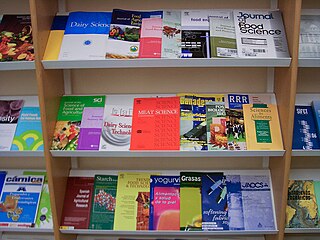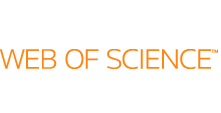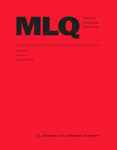
A citation is a reference to a source. More precisely, a citation is an abbreviated alphanumeric expression embedded in the body of an intellectual work that denotes an entry in the bibliographic references section of the work for the purpose of acknowledging the relevance of the works of others to the topic of discussion at the spot where the citation appears.

Bibliography, as a discipline, is traditionally the academic study of books as physical, cultural objects; in this sense, it is also known as bibliology. English author and bibliographer John Carter describes bibliography as a word having two senses: one, a list of books for further study or of works consulted by an author ; the other one, applicable for collectors, is "the study of books as physical objects" and "the systematic description of books as objects".

Academic publishing is the subfield of publishing which distributes academic research and scholarship. Most academic work is published in academic journal articles, books or theses. The part of academic written output that is not formally published but merely printed up or posted on the Internet is often called "grey literature". Most scientific and scholarly journals, and many academic and scholarly books, though not all, are based on some form of peer review or editorial refereeing to qualify texts for publication. Peer review quality and selectivity standards vary greatly from journal to journal, publisher to publisher, and field to field.

An academic journal or scholarly journal is a periodical publication in which scholarship relating to a particular academic discipline is published. They serve as permanent and transparent forums for the presentation, scrutiny, and discussion of research. They nearly universally require peer review for research articles or other scrutiny from contemporaries competent and established in their respective fields.
Japanese studies or Japan studies, sometimes known as Japanology in Europe, is a sub-field of area studies or East Asian studies involved in social sciences and humanities research on Japan. It incorporates fields such as the study of Japanese language, history, culture, literature, philosophy, art, music, cinema, and science.

Rees's Cyclopædia, in full The Cyclopædia; or, Universal Dictionary of Arts, Sciences, and Literature, was an important 19th-century British encyclopaedia edited by Rev. Abraham Rees (1743–1825), a Presbyterian minister and scholar who had edited previous editions of Chambers's Cyclopædia.

Isis is a quarterly peer-reviewed academic journal published by the University of Chicago Press for the History of Science Society. It covers the history of science, history of medicine, and the history of technology, as well as their cultural influences. It contains original research articles and extensive book reviews and review essays. Furthermore, sections devoted to one particular topic are published in each issue in open access. These sections consist of the Focus section, the Viewpoint section and the Second Look section.
Parenthetical referencing is a citation system in which in-text citations are made using parentheses. They are usually accompanied by a full, alphabetized list of citations in an end section, usually titled "references", "reference list", "works cited", or "end-text citations". Parenthetical referencing can be used in lieu of footnote citations.

Modern Language Notes (MLN) is a peer-reviewed academic journal established in 1886 at the Johns Hopkins University, with the intention of introducing continental European literary criticism into American scholarship. The journal is published five times per year, with one issue covering each of the four languages of concern, while the fifth issue focuses on comparative literature. Each issue has its own specific sets of editors.

Project MUSE, a non-profit collaboration between libraries and publishers, is an online database of peer-reviewed academic journals and electronic books. Project MUSE contains digital humanities and social science content from some 400 university presses and scholarly societies around the world. It is an aggregator of digital versions of academic journals, all of which are free of digital rights management (DRM). It operates as a third-party acquisition service like EBSCO, JSTOR, OverDrive, and ProQuest.
The Science Citation Index Expanded is a citation index originally produced by the Institute for Scientific Information (ISI) and created by Eugene Garfield.

The Web of Science is a paid-access platform that provides access to multiple databases that provide reference and citation data from academic journals, conference proceedings, and other documents in various academic disciplines.

Synthese is a monthly peer-reviewed academic journal covering the epistemology, methodology, and philosophy of science, and related issues. The name Synthese finds its origin in the intentions of its founding editors: making explicit the supposed internal coherence between the different, highly specialised scientific disciplines. Jaakko Hintikka was editor-in-chief from 1965 to 2002. The current editors-in-chief are Otávio Bueno, Wiebe van der Hoek, and Kristie Miller.

The British Journal of Aesthetics is a quarterly peer-reviewed academic journal covering philosophical aesthetics and the philosophy of art. It was established in 1960 and is published by Oxford University Press on behalf of the British Society of Aesthetics. The first issue was edited by Harold Osborne in November 1960. The journal was originally published by Routledge and then by Thames & Hudson, before switching to its current publisher in 1975.
American Literature is a literary journal published by Duke University Press. It is sponsored by the American Literature Section of the Modern Language Association. The current editors are Priscilla Wald and Matthew A. Taylor. The first volume of this journal was published in March 1929. Founders include Fred Lewis Pattee, among others.
Food & History is a multilingual scientific journal that is published since 2003. It is the biannual scientific review of the European Institute for the History and Cultures of Food (IEHCA) based in Tours. It publishes papers about the history and culture of food.

The International Journal of the Sociology of Language is a peer-reviewed academic journal covering the field of sociology of language. It was established in 1974 by the eminent sociologist of language Joshua Fishman, who has served many years as editor-in-chief,. Today, the editor is Ofelia Garcia Otheguy. Each issue focuses on a single topic within the scope of the journal's field, for example "Sociolinguistic Issues in Azerbaijan", "The Official Language Minorities in Canada" and "Jewish Language Contact". Each issue also publishes a book review and many issues also include a study relating to the sociology of endangered languages or small language communities. The journal is published by Walter de Gruyter.

Dutch Crossing is an interdisciplinary peer-reviewed academic journal devoted to all aspects of Low Countries studies: history and art history, Dutch and Flemish literary and cultural studies, Dutch language, Dutch as a foreign language, and intercultural and transnational studies. Its stated purpose is to cover "all aspects of 'Global Dutch', not only the Netherlands and the Dutch-speaking part of Belgium but also other places where Dutch historically had or continues to have an impact, including parts of the Americas, Southern Africa, and South-East Asia." A special focus concerns exchanges between the Low Countries and the English-speaking world in all periods from the late Middle Ages to the present day. Dutch Crossing is the official journal of the Association for Low Countries Studies."

Modern Language Quarterly (MLQ), established in 1940, is a quarterly, literary history journal, produced (housed) at the University of Washington and published by Duke University Press. The current editor is Jeffrey Todd Knight. Marshall Brown was the editor from 1993 to 2021.
CRIStin is the national research information system of Norway, and is owned by the Royal Ministry of Education and Research. CRIStin documents all scholarly publications by Norwegian researchers, and complements the BIBSYS database, which focuses on storage and retrieval of data pertaining to research, teaching and learning – historically metadata related to library resources. CRIStin is the first database of its kind worldwide.














